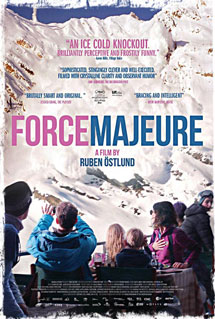Force Majeure starts out with a shocking event that reverberates forcefully through the rest of the film, shaking both the characters and the audience with its impact. Model Swedish couple Tomas and Ebba have taken time to disconnect from work with their two children to come skiing in the French Alps. On their second day, as the family take their seats on the ski lodge patio for lunch, they observe a controlled avalanche billowing down the mountain. The onlookers’ mood catapults from excitement to panic as the avalanche grows ever larger and appears to be about to engulf them, before it stops just short of the lodge, sending an explosion of white powder to cover the scene. Tomas is nowhere to be found during his family’s moment of distress, and it becomes apparent that he fled in the panic. Though he returns to joke about their anticipated brush with death, the incident leaves Ebba questioning the strength of their relationship—and the sanity of her husband, who will not admit that the event occurred as she perceived it.
Set to stirring string music from Vivaldi’s Four Seasons and filmed against the imposing backdrop of the French Alps in winter, Force Majeure is a harrowing marital drama that takes a long look at an uncomfortable subject, personal courage or the lack thereof, raising the specter of divorce and the sanctity of the nuclear family.
The unspoken tension between the couple builds throughout the film as their relationship silently unravels. Swedish filmmaker Ruben Östlund, who started as a director of skiing films in the 1990s, has said that “the film was inspired by a couple of friends of mine who had a similar experience -- of the man not doing what's expected of him”.
In a comedically awkward scene over dinner with two new friends, Ebba attacks her husband for fleeing the avalanche, leaving their bewildered dinner guests to uncomfortably fumble with the private dilemma made public (one helpfully offers, “perhaps you were thinking—like on planes, how you’re supposed to get the mask on yourself first before you help the children—that you would save yourself first and then go back to dig them out?”). Director Östlund revels in the awkward and the uncomfortable, using his dark humor as a subtle commentary about modern relationships.
While Tomas struggles to reassert his role as the family leader and confronts unpleasant questions about himself, he examines what it means to be a provider and a protector. Their unanticipated relationship dilemma sheds light on the unspoken challenges in maintaining a family, and the viewer is left with the unspoken question of what he or she would do in that situation.

